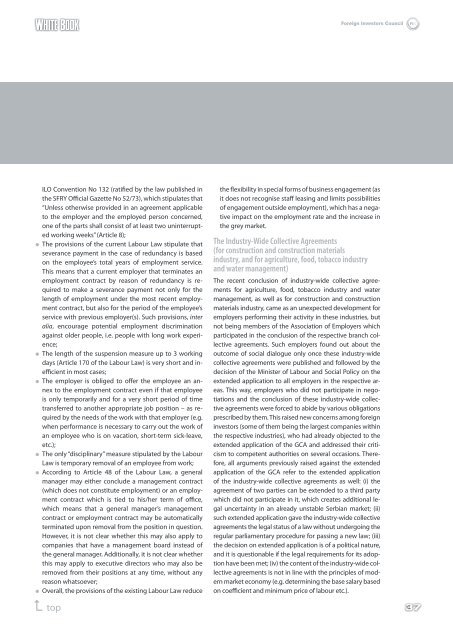Fic rEcommEndationS - Eurobank EFG
Fic rEcommEndationS - Eurobank EFG
Fic rEcommEndationS - Eurobank EFG
You also want an ePaper? Increase the reach of your titles
YUMPU automatically turns print PDFs into web optimized ePapers that Google loves.
ILO Convention No 132 (ratified by the law published in<br />
the SFRY Official Gazette No 52/73), which stipulates that<br />
“Unless otherwise provided in an agreement applicable<br />
to the employer and the employed person concerned,<br />
one of the parts shall consist of at least two uninterrupted<br />
working weeks” (Article 8);<br />
The provisions of the current Labour Law stipulate that<br />
severance payment in the case of redundancy is based<br />
on the employee’s total years of employment service.<br />
This means that a current employer that terminates an<br />
employment contract by reason of redundancy is required<br />
to make a severance payment not only for the<br />
length of employment under the most recent employment<br />
contract, but also for the period of the employee’s<br />
service with previous employer(s). Such provisions, inter<br />
alia, encourage potential employment discrimination<br />
against older people, i.e. people with long work experience;<br />
The length of the suspension measure up to 3 working<br />
days (Article 170 of the Labour Law) is very short and inefficient<br />
in most cases;<br />
The employer is obliged to offer the employee an annex<br />
to the employment contract even if that employee<br />
is only temporarily and for a very short period of time<br />
transferred to another appropriate job position – as required<br />
by the needs of the work with that employer (e.g.<br />
when performance is necessary to carry out the work of<br />
an employee who is on vacation, short-term sick-leave,<br />
etc.);<br />
The only “disciplinary” measure stipulated by the Labour<br />
Law is temporary removal of an employee from work;<br />
According to Article 48 of the Labour Law, a general<br />
manager may either conclude a management contract<br />
(which does not constitute employment) or an employment<br />
contract which is tied to his/her term of office,<br />
which means that a general manager’s management<br />
contract or employment contract may be automatically<br />
terminated upon removal from the position in question.<br />
However, it is not clear whether this may also apply to<br />
companies that have a management board instead of<br />
the general manager. Additionally, it is not clear whether<br />
this may apply to executive directors who may also be<br />
removed from their positions at any time, without any<br />
reason whatsoever;<br />
Overall, the provisions of the existing Labour Law reduce<br />
� top<br />
the flexibility in special forms of business engagement (as<br />
it does not recognise staff leasing and limits possibilities<br />
of engagement outside employment), which has a negative<br />
impact on the employment rate and the increase in<br />
the grey market.<br />
the industry-Wide collective agreements<br />
(for construction and construction materials<br />
industry, and for agriculture, food, tobacco industry<br />
and water management)<br />
The recent conclusion of industry-wide collective agreements<br />
for agriculture, food, tobacco industry and water<br />
management, as well as for construction and construction<br />
materials industry, came as an unexpected development for<br />
employers performing their activity in these industries, but<br />
not being members of the Association of Employers which<br />
participated in the conclusion of the respective branch collective<br />
agreements. Such employers found out about the<br />
outcome of social dialogue only once these industry-wide<br />
collective agreements were published and followed by the<br />
decision of the Minister of Labour and Social Policy on the<br />
extended application to all employers in the respective areas.<br />
This way, employers who did not participate in negotiations<br />
and the conclusion of these industry-wide collective<br />
agreements were forced to abide by various obligations<br />
prescribed by them. This raised new concerns among foreign<br />
investors (some of them being the largest companies within<br />
the respective industries), who had already objected to the<br />
extended application of the GCA and addressed their criticism<br />
to competent authorities on several occasions. Therefore,<br />
all arguments previously raised against the extended<br />
application of the GCA refer to the extended application<br />
of the industry-wide collective agreements as well: (i) the<br />
agreement of two parties can be extended to a third party<br />
which did not participate in it, which creates additional legal<br />
uncertainty in an already unstable Serbian market; (ii)<br />
such extended application gave the industry-wide collective<br />
agreements the legal status of a law without undergoing the<br />
regular parliamentary procedure for passing a new law; (iii)<br />
the decision on extended application is of a political nature,<br />
and it is questionable if the legal requirements for its adoption<br />
have been met; (iv) the content of the industry-wide collective<br />
agreements is not in line with the principles of modern<br />
market economy (e.g. determining the base salary based<br />
on coefficient and minimum price of labour etc.).<br />
37




